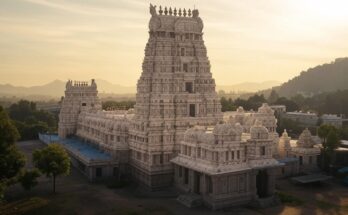
Introduction
Vaikunta Ekadashi, also known as Mukkoti Ekadashi, is one of the most auspicious days in the Hindu calendar, particularly revered by Vaishnavites, the devotees of Lord Vishnu. Observed on the 11th lunar day of the waxing phase in the month of Margashirsha (December-January), this day is celebrated with immense fervor, especially in South India. It’s a day when the spiritual gates to Vaikuntha, the abode of Lord Vishnu, are believed to open, offering devotees a chance to attain moksha or liberation from the cycle of birth and death.
The Mythological Significance
The significance of Vaikunta Ekadashi is deeply rooted in Hindu mythology, with its story outlined in the ‘Padma Purana’. According to legend, a demon named Muran terrorized the devas (gods), who then sought the intervention of Lord Vishnu. During a fierce battle, when Vishnu took a moment to rest in a cave, Muran attempted to ambush him.
From Vishnu’s chest emerged a divine feminine energy named Ekadashi, who vanquished the demon. Impressed by her valor, Vishnu granted her a boon, allowing those who observe a fast on Ekadashi day to reach Vaikuntha. This narrative underscores the sanctity of the day and the power of fasting and devotion.
Another tale involves the demons Madhu and Kaidapa, who, after being defeated by Vishnu, asked for the boon that anyone who sees Vishnu through the Vaikuntha Dwaram (door) on this day would also reach Vaikuntha. This belief has led to the tradition of special Vaikuntha Dwaram doors being opened in Vishnu temples on this day.
Rituals and Observances
Vaikunta Ekadashi is marked by a series of rituals aimed at purifying the soul and seeking divine blessings:
- Fasting: Devotees typically observe a strict fast, abstaining from grains, especially rice, which is believed to be the abode of certain demons on Ekadashi days. Some choose to consume only fruits, milk, or specific Ekadashi foods like sago or water chestnut.
- Temple Visits: Temples dedicated to Vishnu, like the famed Tirumala Venkateswara Temple in Tirupati and the Srirangam Sri Ranganatha Swamy Temple, see thousands of devotees. A special feature of this day is the opening of the ‘Vaikuntha Dwaram’ or ‘Paramapada Vasal’, a door symbolizing the path to Vaikuntha, through which devotees pass to gain divine grace.
- Chanting and Prayer: Reciting the Vishnu Sahasranama, chanting the Hare Krishna Mahamantra, and reading sacred texts like the Bhagavad Gita or Vishnu Purana are common practices. The night is often spent in vigil, singing bhajans and listening to stories of Lord Vishnu.
- Charity and Service: Acts of charity, including feeding the poor and distributing prasadam (blessed food), are considered highly meritorious on this day.
Cultural Impact and Celebrations
The festival’s celebration varies in intensity across regions but is most elaborate in South India. Temples are adorned with flowers, and special pujas (prayers) are conducted. In places like Tirupati, the Vaikunta Ekadashi festivities extend over several days, with millions of devotees making the pilgrimage. The event often includes processions, cultural programs, and community feasts.
Modern Implications and Challenges
While Vaikunta Ekadashi remains a beacon of spiritual practice, it also faces modern challenges such as managing large crowds and ensuring safety during festivals. Incidents like the stampede at Tirupati in 2025 underscore the need for better crowd management and infrastructure to accommodate the influx of devotees safely.
Vaikunta Ekadashi is more than just a day of fasting; it’s a profound spiritual exercise where devotees seek to connect with the divine, cleanse their souls, and aspire for a place in Vaikuntha. Through its legends, rituals, and community gatherings, this festival encapsulates the essence of devotion, the pursuit of liberation, and the celebration of faith in Lord Vishnu. As time progresses, while the core of the festival remains unchanged, its observance continues to adapt, reflecting the dynamic nature of cultural and religious practices in contemporary society.
Ekadashi fasting benefits
Ekadashi fasting, observed on the 11th day of both the waxing and waning phases of the moon each month in the Hindu calendar, holds both spiritual and health benefits. Here’s an elaboration on the advantages of Ekadashi fasting:
Spiritual Benefits:
- Spiritual Purification: Fasting on Ekadashi days is believed to purify the soul, cleanse one’s sins, and bring the devotee closer to the divine, specifically Lord Vishnu. It’s thought to facilitate spiritual growth and enlightenment.
- Liberation: Observance of Ekadashi fasts is said to help in achieving moksha (liberation from the cycle of birth and death). The legend of Ekadashi from Hindu scriptures states that the goddess Ekadashi herself grants liberation to those who observe the fast with devotion.
- Mental Clarity: Abstaining from food, especially grains, is believed to detoxify the mind, leading to enhanced mental clarity, peace, and an increase in spiritual practices like meditation and prayer.
- Karmic Cleansing: Ekadashi is considered a day when the spiritual gates to Vaikuntha (Lord Vishnu’s abode) open, offering a unique opportunity for karmic cleansing and accumulation of merit.
Health Benefits:
- Detoxification: Fasting allows the digestive system a break, which can aid in detoxification of the body. By avoiding grains, some of which might be hard to digest, the body has time to repair and cleanse itself.
- Digestive Health: Regular fasting can improve digestion by giving the stomach and intestines a rest, potentially leading to better nutrient absorption, reduced bloating, and improved gut health.
- Weight Management: Although not the primary goal, fasting can help in weight control by reducing calorie intake periodically. It also promotes mindful eating once the fast is broken.
- Mental Health: The discipline required in fasting can lead to better self-control, patience, and can have a calming effect on the mind. It’s often associated with lower stress levels due to the meditative and introspective practices adopted during the fast.
- Metabolic Health: Intermittent fasting, akin to Ekadashi fasting, has been linked in modern health research to improved insulin sensitivity, lower cholesterol levels, and better cardiovascular health.
- Autophagy: Fasting triggers autophagy, a process where cells clean out damaged components, which can contribute to longer life and health span.
Additional Considerations:
- Community and Social Benefits: Fasting on Ekadashi often involves community activities, charity, and sharing of food (prasadam), fostering a sense of community, empathy, and social connection.
- Discipline and Willpower: The practice of fasting helps in building discipline, self-control, and willpower, attributes that extend beyond spiritual practices into daily life.
Caveats:
- Health Considerations: While fasting has numerous benefits, it’s not suitable for everyone. Individuals with certain health conditions, pregnant or nursing mothers, children, and the elderly should consult with healthcare providers before undertaking a fast.
- Mindful Breaking of Fast: How one breaks the fast is also crucial. Starting with light, easy-to-digest foods helps mitigate potential digestive discomfort.
Ekadashi fasting intertwines spiritual aspirations with health benefits, offering a holistic approach to well-being. It’s a practice that encourages not just physical abstinence but also mental and spiritual engagement, promoting a lifestyle of balance, mindfulness, and devotion.
Spiritual purification is a concept embraced by many religious and spiritual traditions worldwide, aimed at cleansing the soul, mind, or spirit from negative influences, energies, or karmic baggage. Here are various methods used across different cultures and spiritual practices for achieving spiritual purification:
1. Meditation
- Mindfulness Meditation: Focuses on being present and aware, helping to clear the mind of negative thoughts.
- Transcendental Meditation: Involves the use of a mantra to transcend normal thinking and experience pure awareness, which can lead to spiritual clarity.
- Chakra Meditation: Concentrates on aligning and cleansing the body’s energy centers.
2. Fasting
- Religious Fasts: Like Ekadashi in Hinduism, Ramadan in Islam, or Lent in Christianity, fasting can involve abstaining from food, certain foods, or even water to purify the body and soul.
- Intermittent Fasting: Even outside religious contexts, fasting can be viewed as a method to cleanse the body and focus the mind on spiritual matters.
3. Ritual Baths
- Holy Dips: Bathing in sacred rivers like the Ganges in Hinduism or at specific holy sites is believed to wash away sins.
- Salt Baths: Using Epsom salts or sea salt in baths for purification, often combined with essential oils or herbs for their cleansing properties.
4. Prayer and Mantras
- Chanting: Reciting sacred sounds, mantras, or prayers repeatedly to cleanse the spirit, like the Hare Krishna mantra or the Gayatri Mantra.
- Prayer: Deep, sincere prayer across various religions is seen as a way to connect with the divine and purify one’s soul.
5. Smudging and Incense
- Smudging: Using smoke from burning herbs like sage, cedar, or palo santo to clear negative energy from a space or person.
- Incense: Burning incense during rituals or meditation to purify the environment or as an offering to purify the self through spiritual significance.
6. Pilgrimages
- Traveling to sacred places, like Mecca for Muslims during Hajj or the Camino de Santiago for Christians, can be a profound journey of purification.
7. Confession and Repentance
- Many traditions, including Christianity, have practices of confession where one acknowledges and seeks forgiveness for sins, providing spiritual relief and purification.
8. Yoga and Breath Work
- Yoga: Certain yoga practices, especially those focused on pranayama (breath control), aim at purifying the body’s energy channels.
- Breath Work: Techniques like alternate nostril breathing or Kapalabhati are said to clear blockages in the energy system.
9. Silence and Solitude
- Retreats or periods of silence (like Vipassana meditation retreats) allow for introspection, self-evaluation, and purification through detachment from worldly distractions.
10. Sacred Texts
- Reading or chanting from holy books like the Bhagavad Gita, the Bible, the Quran, or the Torah is seen as a way to spiritually cleanse oneself by connecting with divine wisdom.
11. Nature and Grounding
- Engaging with nature, whether through gardening, walking barefoot on earth (earthing), or simply spending time in natural settings, can be grounding and purifying.
12. Rituals and Ceremonies
- Specific ceremonies for purification exist in many cultures, like the Native American sweat lodge or the Japanese Shinto misogi ritual involving purification through water.
Each method can be profound when practiced with sincerity, intention, and respect for its cultural or religious context. While some methods are universal, others are deeply tied to specific traditions, so understanding the cultural or spiritual background can enhance the purification experience. Remember, spiritual purification often involves not just external practices but also internal reflection and change.
LIVE : VAIKUNTA EKADASHI SPECIAL - LORD VISHNU BHAGAVAN DEVOTIONAL SONGS 2025 | TELUGU BHAKTHI SONGS
telugudevotionalsongs #telugubhaktisongs LIVE : VAIKUNTA EKADASHI SPECIAL - LORD VISHNU BHAGAVAN DEVOTIONAL ...
வைகுண்ட ஏகாதசி 2025 - முழு விரத முறை, விரத நாட்கள், நேரம் & பலன்கள் | Vaikunta Ekadasi Viratham
வைகுண்ட ஏகாதசி வரலாறு | சிறப்புகள் & தாத்பரியம் | Vaikunta Ekadasi History ...
ವೈಕುಂಠ ಏಕಾದಶಿಯಂದು ಉಪವಾಸ ಮಾಡುವುದು ಹೇಗೆ ಸಂಪೂರ್ಣ ಮಾಹಿತಿ| vaikunta ekadasi 2025
ವೈಕುಂಠ ಏಕಾದಶಿಯಂದು ಉಪವಾಸ ಮಾಡುವುದು ಹೇಗೆ ಸಂಪೂರ್ಣ ಮಾಹಿತಿ| vaikunta ekadasi 2025 ...
Vaikunta Ekadasi 2025 | Mukkoti Ekadashi Pooja & Mantram | Nandibatla Srihari Sharma | TSW
Watch▻ Vaikunta Ekadasi 2025 | Mukkoti Ekadashi Pooja & Mantram | Nandibatla Srihari Sharma | TSW #teluguspiritualworld ...
ముక్కోటి ఏకాదశి పూజ విధానం | vaikunta ekadasi 2025 pooja vidhanam | 2025 Uttara dwara darshanam
mukkotiekadasi2025poojavidhanam #vaikuntaekafasipoojavidhanam #mukkotiekadasipoojavidhanam ...
ವೈಕುಂಠ ಏಕಾದಶಿ ಉಪವಾಸ, ಪೂಜೆಯನ್ನು ಮನೆಯಲ್ಲೇ ಸರಳವಾಗಿ ಮಾಡುವ ವಿಧಾನ/how to perform vaikunta ekadashi pooja
ವೈಕುಂಠ ಏಕಾದಶಿ ಉಪವಾಸ, ಪೂಜೆಯನ್ನು ಮನೆಯಲ್ಲೇ ಸರಳವಾಗಿ ಮಾಡುವ ವಿಧಾನ. how to ...
నేను చేసుకున్న వైకుంఠ ఏకాదశి పూజ | Vaikunta Ekadasi Pooja Vidhanam | Vaikunta Ekadasi 2023
ముక్కోటి ఏకాదశి పూజ కోసం అన్నీ సిద్దం చేసుకున్న |Vaikunta Ekadasi Pooja ...
வைகுண்ட ஏகாதசி 2023 - vaikunta ekadasi story 2023 - Aanmeega thagavalgal in tamil
வைகுண்ட ஏகாதசி 2023 - vaikunta ekadasi story 2023 - Aanmeega thagavalgal in tamil வைகுண்ட ஏகாதசி ...
ವೈಕುಂಠ ಏಕಾದಶಿ ದಿನ ಯಾಕೆ ಉಪವಾಸ ಮಾಡ್ತಾರೆ? Vaikunta Ekadashi 2023 | Suvarna News
Vaikunta Ekadashi 2023 | ವೈಕುಂಠ ಏಕಾದಶಿಯ ಆಚರಣೆ ಹೇಗಿರಬೇಕು? Suvarna News #VaikuntaEkadashi ...
ముక్కోటి ఏకాదశి Vaikunta Ekadasi 2025 Date | Mukkoti Ekadasi | Puja Vidhanam | Upavasam Yela Cheyali
Vaikunta Ekadasi 2025 - Significance and Rituals Join us as we delve into the spiritual importance of Mukkoti Ekadasi, also ...
ఈ నెల 10న వైకుంఠ ఏకాదశి 2025 | Pranavananda Das Vaikunta Ekadashi 2025 | SumanTV Devotional
Watch ▻ ఈ నెల 10న వైకుంఠ ఏకాదశి 2025 | Pranavananda Das Vaikunta Ekadashi 2025 | SumanTV Devotional ...
vaikunta ekadashi whatsapp status|tirupati balaji status|venkateshwara swami whatsapp status|
vaikunta ekadashi status 2020|7 doors heaven|Govinda status|balaji whatsapp status|tirupati balaji whatsapp status|vaikunta ...
Vaikunta Ekadasi Pooja Vidhanam | Mukkoti Ekadashi 2023 | Uttara Dwara Darshanam
ముక్కోటి ఏకాదశి పూజ విధానం|| Vaikunta Ekadashi | Mukkoti Ekadashi 2023 Pindi Pramidalu chese ...
LIVE: వైకుంఠ ఏకాదశి స్పెషల్ ఉత్తర ద్వార దర్శనం| Vaikunta Ekadashi Special Tirumala Vaikunta Ekadashi
LIVE: వైకుంఠ ఏకాదశి స్పెషల్ ఉత్తర ద్వార దర్శనం | Vaikunta Ekadashi Special | Tirumala ...
Vaikunta Ekadashi: Devotees Throng Temples in The City ,Offer Prayers for Lord Vishnu | TV5 Kannada
Vaikunta Ekadashi: Devotees Throng Temples in The City ,Offer Prayers for Lord Vishnu TV5 Kannada - News You can trust.




